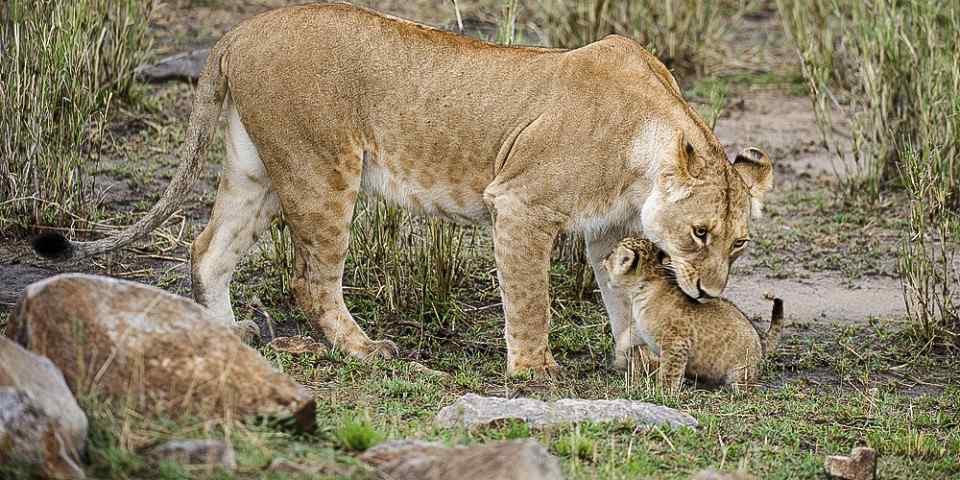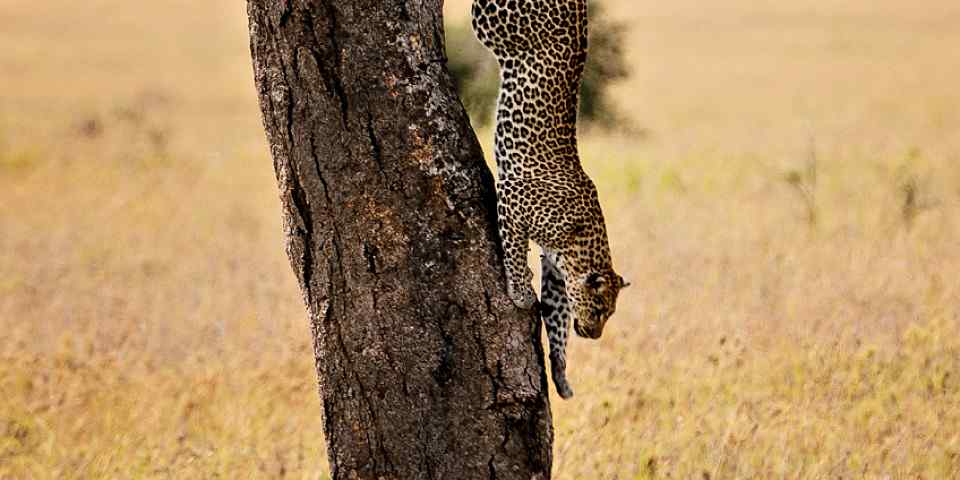Tour Length
Rates in USD $ – Change Currency
Per person, excl. international flightsOperator Rating
Other Tour Features
Filter by Operator
Filter by Accommodation
African Budget Safaris & Tours
An African safari is often seen as being a once-in-a-lifetime experience. A quick glance at the eye-wateringly high prices charged by the top-end safari operators will make you realize why. But, with a bit of careful planning, an African safari trip needn’t be so expensive. To enjoy the adventures and wildlife sightings of an African safari without the big price tag, forgo the frills and luxury. Choose your operator carefully and do some research into what you’ll be getting for the price of your budget safari package.
-

4-Day Shared Group Budget Camping
$735 pp (USD)
Tanzania: Shared tour (max 7 people per vehicle)BudgetCamping
You Visit: Arusha (Start), Tarangire NP, Serengeti NP, Ngorongoro Highlands, Ngorongoro Crater, Arusha (End)

African Chitah
4.9/5 – 86 Reviews
-
Best Seller

8-Day Kenya Safari Masai Mara Nakuru Naivasha Amboseli
$990 to $1,320 pp (USD)
Kenya: Shared tour (max 7 people per vehicle)BudgetTented Camp & Hotel
You Visit: Nairobi (Start), Masai Mara NR, Lake Nakuru NP, Lake Naivasha (Naivasha), Amboseli NP, Nairobi (End)

Bienvenido Kenya Tours and Safaris
4.7/5 – 124 Reviews
-

5-Day Join Tour Serengeti Crater Manyara and Tarangire
$990 pp (USD)
Tanzania: Shared tour (max 6 people per vehicle)BudgetCamping
You Visit: Arusha (Start), Tarangire NP, Serengeti NP, Ngorongoro Crater, Arusha (End)

Taswira Africa Safaris
5.0/5 – 27 Reviews
-
Top Rated Operator

4-Day Group Tour to Tarangire, Serengeti, Ngorongoro
$825 pp (USD)
Tanzania: Shared tour (max 6 people per vehicle)BudgetCamping
You Visit: Arusha (Start), Tarangire NP, Serengeti NP, Ngorongoro Crater, Arusha (End)

Suricata Safaris
5.0/5 – 2,794 Reviews
-
![3-Day Amboseli National Park Safari with Mt Kilimanjaro]()
3-Day Amboseli National Park Safari with Mt Kilimanjaro
$505 pp (USD)
Kenya: Private tourBudgetTented Camp
You Visit: Nairobi (Start), Amboseli NP, Jomo Kenyatta Airport (End)

Johnbow Tours and Travel
4.8/5 – 27 Reviews
-
Top Rated Operator
![3-Day Chimpanzee Trekking & Canopy Walk in Nyungwe Park]()
3-Day Chimpanzee Trekking & Canopy Walk in Nyungwe Park
$1,253 pp (USD)
Rwanda: Private tourBudgetGuest House
You Visit: Kigali (Start), Nyungwe NP (Chimps), Kigali (End)

Hermosa Life Tours and Travel
5.0/5 – 169 Reviews
-
![5-Day Gorillas Chimpanzees and Wildlife Safari in Uganda]()
5-Day Gorillas Chimpanzees and Wildlife Safari in Uganda
$2,046 pp (USD)
Uganda: Private tourBudgetLodge & Guest House
You Visit: Entebbe (Start), Queen Elizabeth NP, Ishasha Sector (Queen Elizabeth NP), Bwindi Impenetrable NP (Gorillas), Lake Mburo NP, Equator point Uganda (Highlight), Entebbe (End)

Dav Safaris
4.9/5 – 116 Reviews
-
Top Rated Operator
![7-Day Northern Parks Budget Safari Tent]()
7-Day Northern Parks Budget Safari Tent
$2,194 pp (USD)
Tanzania: Private tourBudgetLodge & Tented Camp
You Visit: Arusha (Start), Tarangire NP, Ngorongoro Crater, Serengeti NP, Lake Natron, Lake Manyara NP, Arusha (End)

Shemeji Safari Tanzania
4.8/5 – 294 Reviews
-
![4-Day Bwindi Gorilla and Kibale Chimp Tracking Safari]()
4-Day Bwindi Gorilla and Kibale Chimp Tracking Safari
$1,958 pp (USD)
Uganda: Private tourBudgetLodge & Guest House
You Visit: Entebbe (Start), Bwindi Impenetrable NP (Gorillas), Kibale NP (Chimps), Entebbe (End)

Frena Adventures
5.0/5 – 123 Reviews
-
![7-Day Tailor-Made Holiday and Tour in Uganda via Rwanda]()
7-Day Tailor-Made Holiday and Tour in Uganda via Rwanda
$2,581 pp (USD)
Rwanda & Uganda: Private tourBudgetLodge & Guest House
You Visit: Kigali (Start), Kisoro (Town), Bwindi Impenetrable NP (Gorillas), Queen Elizabeth NP, Lake Mburo NP, Entebbe Airport (End)

Home To Africa Tours and Travel
5.0/5 – 298 Reviews
-
![7-Day Affordable Tanzania Safari – Big Five & More]()
7-Day Affordable Tanzania Safari – Big Five & More
$1,960 pp (USD)
Tanzania: Private tourBudgetCamping & Hotel
You Visit: Arusha (Start), Arusha NP, Tarangire NP, Serengeti NP, Ngorongoro Crater, Foothills of Mt Kilimanjaro, Arusha (End)

Goldfinch Adventures
5.0/5 – 49 Reviews
-
Top Rated Operator
![7-Day Best Northern Circuit Private Camping Safari]()
7-Day Best Northern Circuit Private Camping Safari
$1,815 pp (USD)
Tanzania: Private tourBudgetCamping & Hotel
You Visit: Arusha (Start), Materuni Waterfalls (Highlight), Tarangire NP, Serengeti NP, Ngorongoro Crater, Arusha (End)

Serengeti Wakanda Tours and Safaris
5.0/5 – 624 Reviews
-
![5-Day Explore Nature in Close Camping Budget Safari]()
5-Day Explore Nature in Close Camping Budget Safari
$968 pp (USD)
Tanzania: Shared tour (max 6 people per vehicle)BudgetGuest House & Hotel
You Visit: Arusha (Start), Tarangire NP, Serengeti NP, Central Serengeti NP, Ngorongoro Crater, Lake Manyara NP, Arusha (End)

Adventures In Tanzania Safari
4.6/5 – 13 Reviews
-
![8-Day Amboseli, Masai Mara, Lake Nakuru & Mombasa]()
8-Day Amboseli, Masai Mara, Lake Nakuru & Mombasa
$1,320 to $1,386 pp (USD)
Kenya: Shared tour (max 7 people per vehicle)BudgetTented Camp & Resort
You Visit: Nairobi (Start), Masai Mara NR, Lake Nakuru NP, Amboseli NP, Mombasa Beaches, Haller Park (Highlight), Nairobi (End)

Eta Adventure Safaris
4.8/5 – 32 Reviews
-
Best Seller
![7-Day Tanzania Holiday Experience & Materuni Waterfalls]()
7-Day Tanzania Holiday Experience & Materuni Waterfalls
$1,300 pp (USD)
Tanzania: Shared tour (max 6 people per vehicle)BudgetCamping & Hotel
You Visit: Arusha (Start), Tarangire NP, Serengeti NP, Ngorongoro Crater, Lake Manyara NP, Materuni Waterfalls (Highlight), Arusha (End)

Go Serengeti African Tours
4.9/5 – 297 Reviews
-
Top Rated Operator
![6-Day Serengeti Wildebeest Migration Camping Safari]()
6-Day Serengeti Wildebeest Migration Camping Safari
$1,276 pp (USD)
Tanzania: Shared tour (max 6 people per vehicle)BudgetCamping & Lodge
You Visit: Arusha (Start), Tarangire NP, Central Serengeti NP, Serengeti NP, Ngorongoro Crater, Lake Manyara NP, Arusha (End)

Meru Slopes Tours & Safaris
5.0/5 – 464 Reviews
-
Top Rated Operator

3-Day Comfort Glamping Kruger Safari
$439 pp (USD)
South Africa: Shared tour (max 10 people per vehicle)BudgetTented Camp
You Visit: Johannesburg (Start), Kruger NP, Johannesburg (End)

MoAfrika Tours
4.9/5 – 2,401 Reviews
-
Top Rated Operator
![8-Day Safari with Game Drives and Cycling and Walking]()
8-Day Safari with Game Drives and Cycling and Walking
$2,420 pp (USD)
Tanzania: Private tourBudgetCamping & Hotel
You Visit: Arusha (Start), Tarangire NP, Lake Manyara NP, Serengeti NP, Ngorongoro Crater, Materuni Waterfalls (Highlight), Arusha (End)

Safari Soles
5.0/5 – 341 Reviews
-
Top Rated Operator
![3-Day Fly-in Safari and Camping Experience]()
3-Day Fly-in Safari and Camping Experience
$1,485 pp (USD)
Tanzania: Private tourBudgetCamping
You Visit: Zanzibar (Start), Serengeti NP, Ngorongoro Crater, Zanzibar (End)

Mountain Warriors Tours and Safaris
4.9/5 – 250 Reviews
-
![5-Day Tanzania Safari Budget Tour]()
5-Day Tanzania Safari Budget Tour
$1,869 pp (USD)
Tanzania: Shared tour (max 6 people per vehicle)BudgetCamping
You Visit: Arusha (Start), Lake Manyara NP, Serengeti NP, Ngorongoro Crater, Arusha (End)

Gosheni Safaris Africa
5.0/5 – 495 Reviews
6 Questions About Budget Safari Tours

Answered by
Stuart Butler
Stuart Butler is a travel writer, photographer and author of many guidebooks for Lonely Planet, Rough Guides and Bradt, including guides to Kenya, Ethiopia, Rwanda and Tanzania. Over the past 25 years he has traveled widely in Africa and spends considerable time there each year on safari.› More about Stuart
6 Questions About Budget Safari Tours
 Stuart Butler
Stuart Butler
Which African countries are most suitable for a budget trip?
“Although it’s possible to do a budget safari in almost any African safari country, some places are better than others. South Africa, with its wide variety of parks and private reserves is a natural choice for a cheap safari holiday. You can even create your own budget safari easily. Some options for this include self-driving and using campsites and budget hotels. The South African National Parks board often has good-value banda accommodation, which have simple rooms with limited facilities. There are also plenty of small reserves in South Africa that can be accessed by public transport. In southern Africa, Namibia is another good destination for a cheap safari tour, for much the same reason as South Africa. Park entry fees in East Africa tend to be higher than in southern Africa. However, Kenya has a massive number of companies offering budget safaris. The competition between operators means it’s possible to get some good deals here. If you plan it well, Uganda can be another good option. The parks here are often quiet and you can also see mountain gorillas. While gorilla trekking could never be described as ‘cheap’, Uganda is certainly the cheapest place to see habituated chimpanzees.”
1What is included in a budget African safari package?
“Exactly what is included in a budget safari in Africa naturally varies between safari companies, and the country and parks visited. There are some common inclusions though. A vehicle and driver, some form of accommodation (often camping) and basic meals will always be included. Park entry fees may or may not be included. It is always best to check with the tour operator about inclusions when booking your budget tour.”
2What are the differences between a budget and luxury safari?
“As with anything, you get what you pay for. A budget African safari will mean fewer extras and options than a luxury safari. On a luxury safari the vehicle, guide, accommodation and food will be top-notch. However, at the end of the day, you’ll still see the same lions and elephants. A budget safari will generally involve camping or using budget accommodation just outside the park to save on costs. A luxury safari uses lodges or exclusive tented camps that are typically located in an area where the wildlife viewing is excellent.”
3What type of vehicles can I expect?
“At best, the vehicle will be a modified Land Rover or something similar, with open sides or a roof that comes off. In East Africa, 4x4 minivans with a pop-top roof are more common for budget safaris. On shared group safaris, you will be joining other people. If the vehicle is full to capacity it might feel crowded. Check what the seating capacity of the vehicle will be before you book. Also check the maximum number of people who could be in the group. If you are going for a super-cheap safari, you should also inquire about the wildlife expertise of your driver guide and the overall condition of the vehicle. These types of safaris are often booked through backpacker hostels.”
4What kind of accommodation can I expect?
“Almost invariably on a cheap safari tour, you will be camping inside the park or staying in budget accommodation just outside the park. Some countries, such as South Africa and Namibia, also offer affordable accommodation inside certain parks, run by the park authority. The experience of sleeping in a two-person dome tent might not be as swish as the infinity pools and comfortable mattresses of the luxury lodges. However, listening to the hoots and growls of the savannah at night is something that no amount of infinity pools can replace. The budget accommodation can be a mixed bag. Some places have lots of character, but others simply feel run-down. Be sure to check the internet for reviews. ”
5What should I consider when choosing a budget African safari?
“It’s important to nail down exactly what you’re paying for on any kind of safari. But it’s even more vital for a budget safari package. One question to consider is how many other people will be in the vehicle with you. Fewer is better. At the very least, ensure that every passenger has a window seat. Find out what kind of vehicle you’re using and the wildlife knowledge of your driver guide. Find out where you’ll be staying. Check out guidebook and online reviews first. If the reviews are poor, stay elsewhere even if it means paying a bit more. It’s also important to confirm how far your accommodation is from the actual park. More than a half-hour’s drive away is too far. What sort of food will you be served? If it’s a camping safari, who is responsible for cooking the meals and other camp chores? Confirm whether water and other drinks are included in the price. Also, check whether park entry fees are included in the package cost as these can be a significant extra cost. Most importantly, examine the schedule. There is a tendency among safari companies (and tourists) to try and cram too many parks into too short a time period. The result is that you spend more time traveling to and from each park than you do on actual safari.”
6























_1813_5e20b935b89f3.gif)








